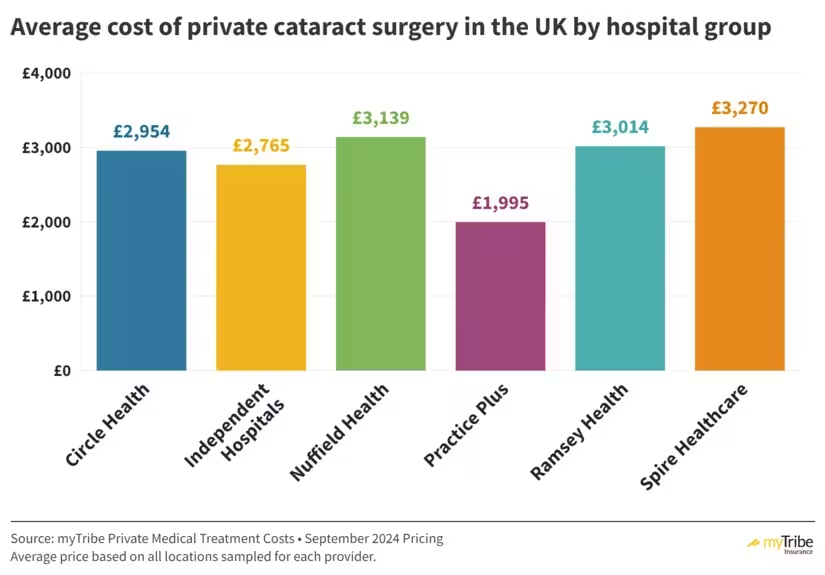How much does private cataract surgery cost in the UK?
In this guide, we look at what to expect from cataract surgery along with sharing the typical cost of private survery in the UK.
Are you stuck on a waiting list and looking for treatment?


What are cataracts?
The front of your eye has a clear disc called a lens. This is usually clear, but cloudy patches can start forming as we age - this is known as a cataract.
A cataract can form slowly or quickly depending on whether a patient has any medical conditions impacting their vision and overall health.
Cataracts can cause vision loss. The World Health Organisation has reported that they're the world's leading cause of blindness if untreated. That's why it's essential to seek treatment and consider cataract surgery at an early stage.

Your consultant ophthalmic surgeon will consider the impact of the cataract on your quality of life and not just your eye test results. If you're an NHS patient, you'll be offered cataract surgery if your vision loss severely affects your daily life.
What are the benefits of cataract surgery?
The main benefit of cataract surgery is the dramatic improvement in your sight. A cataract can cause blurred vision, difficulty distinguishing between colours, and glare when looking at bright light. An operation can relieve all of these symptoms.
It's important to note that if you have another eye condition, for example, glaucoma or diabetes, you may still have some issues with your sight.
Are there any alternatives to surgery?
Eye surgery is relatively safe, however, you may want to wait, have regular checkups, and see how your cataract affects your daily life before you decide whether to have surgery.
There aren't currently any other treatments or medications to improve a cataract.
Private treatment has various benefits, from shorter waiting times to hotel-style facilities. Here are some of the benefits of opting for private eye surgery.

Your surgery cost will depend on several factors. The prices can vary depending on the location of your hospital or clinic and the facilities on offer.
It's important to consider what facilities are essential to you. Are you willing to travel further to see more experienced surgeons? If you've already had a consultation at an NHS hospital, you may be able to see the same consultant on a private basis.
We recommend getting quotes from different providers to make a comparison.
How much does cataract surgery cost?
The cost of cataract surgery in the UK varies depending on your location, with the average currently being £2,953 (September 2024).
Surprisingly, prices for cataract surgery were highest in Yorkshire and The Humber, with an average cost of £4,112. Normally, we'd expect to see London as one of the highest, but this was on average £2,724 with only the South East at £2,643 and the East Midlands at £5,514 coming in below.
Assessing quotes
If you've contacted several hospitals and received quotes, it's important to check each one carefully to see what's included. You should be given a fixed price quote, but some will only cover the surgery, while others will include follow-up appointments.
You may see additional costs if your consultant has recommended further tests. Check whether your treatment package includes follow-up visits.

It's important to remember that these costs will vary depending on the hospital and eye surgeon you choose.
Now you know how much you can expect to pay, you might wonder how you can fund the operation. You have a few different payment options, including insurance, a finance plan, or paying for treatment yourself.
Here's what you can expect from the entire process, from the run-up to your operation to your recovery.
Preparing for surgery
You'll have an initial consultation before your operation. Some private clinics, such as Optical Express, perform your assessment on the day of your surgery, while others offer a separate appointment.
The assessment includes checking your vision and taking measurements of your eyes. Your specialist will discuss the procedure and what happens when your treatment is complete.
The operation
The operation is usually carried out under local anaesthetic. You'll also be given eye drops.
The surgeon makes a small incision in your eye, removes the cloudy lens and replaces it with a lens implant.
The whole process takes from 30-45 minutes.
After the procedure
When the procedure is complete, you can rest in a recovery room. You'll have a shield and dressing over your eye; your surgeon will tell you how long you'll need to wear this.
You should be able to go home on the same day. It may take a few days for your sight to return to normal, so it's a good idea to ask a friend or relative to drive you home.
Most patients experience blurred or double vision, a bloodshot eye, grittiness and watering eyes for a few days afterwards.
Recovery
A full recovery can take around 4-6 weeks. You'll be given eye drops and advice about using your eye shield. You should rest for a few days but can still read and watch TV. You can shower as usual, but it's important to avoid getting soap or shampoo in your eye.
You should also avoid swimming and wearing eye makeup for 4 to 6 weeks. Your doctor will tell you when you can return to work or start driving again.
If you still need glasses after your operation, you'll need to let your vision settle before having an eye test. Many opticians find that their patient's prescription has changed.

Most patients make a full and straightforward recovery; however, around 1 in 50 patients will experience serious complications. These can include sight loss, blurred vision or a detached retina.
Retinal tears can be resolved with laser eye surgery; however, a detachment typically needs an operation. Other complications can be resolved with surgery or medication.
There is a slight risk of permanent sight loss, which affects around 1 in 1,000 patients.
If you have a cataract, we hope this guide has helped you to consider your options and the benefits of private treatment.
What our readers say
We are rated Excellent on Google from 150+ reviews. Our reviews relate to the service provided by both myTribe and its partners.
Disclaimer: This information is general and what is best for you will depend on your personal circumstances. Please speak with a financial adviser or do your own research before making a decision.
Frequently Asked Questions
Can I have my cataract operation at a private hospital?
Yes, you can. You can choose a private hospital or a specialist clinic and fund this yourself or with private medical insurance.
How much does cataract surgery cost?
The average cost of cataract surgery in the UK is £2,953 (September 2024).
Are there different types of lens replacement surgery?
If you have treatment on the NHS you'll be given a monofocal lens implant with a fixed focal point. Private treatment allows you to choose a multifocal lens implant that can correct other visual impairments and avoid the need for separate laser eye surgery.
What happens during a cataract operation?
Your surgeon makes a small incision in your eye and replaces your cloudy lens with a lens implant. Patients can typically go home on the same day as the procedure and make a full recovery in 4-6 weeks.









